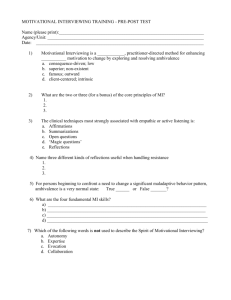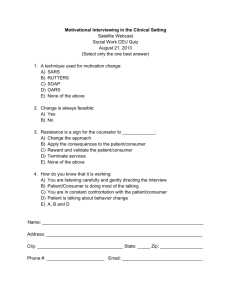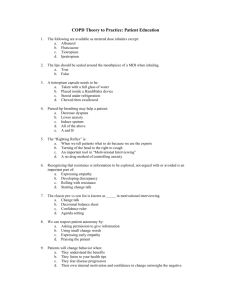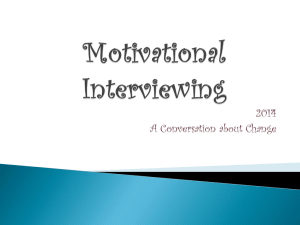T U N C
advertisement
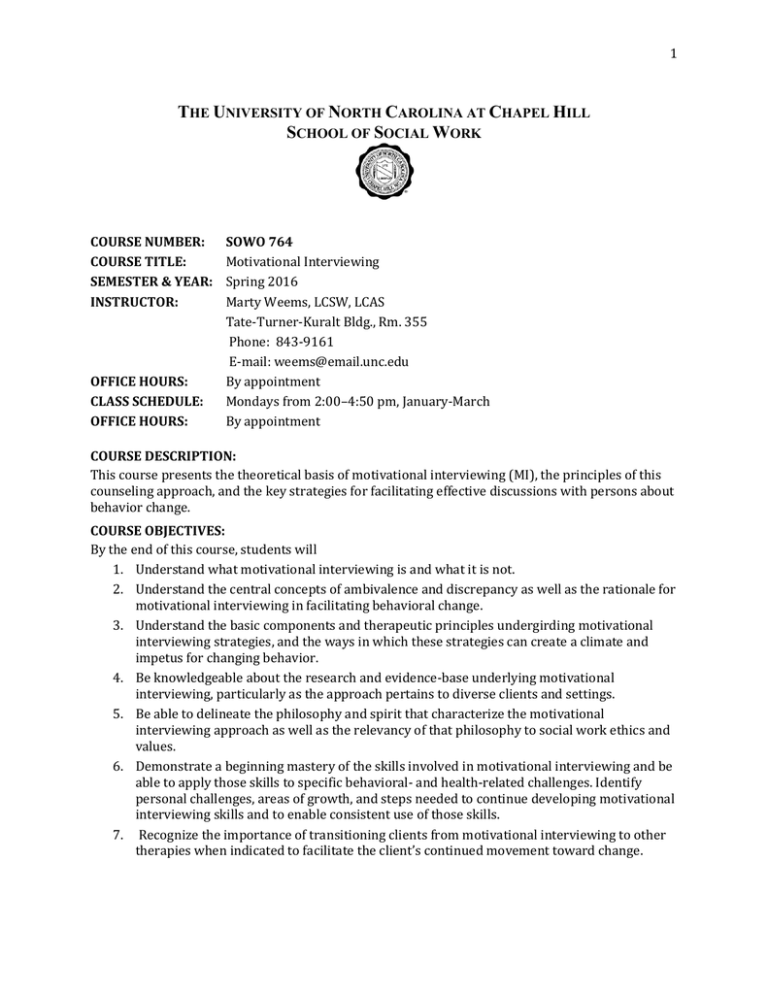
1 THE UNIVERSITY OF NORTH CAROLINA AT CHAPEL HILL SCHOOL OF SOCIAL WORK COURSE NUMBER: COURSE TITLE: SEMESTER & YEAR: INSTRUCTOR: OFFICE HOURS: CLASS SCHEDULE: OFFICE HOURS: SOWO 764 Motivational Interviewing Spring 2016 Marty Weems, LCSW, LCAS Tate-Turner-Kuralt Bldg., Rm. 355 Phone: 843-9161 E-mail: weems@email.unc.edu By appointment Mondays from 2:00–4:50 pm, January-March By appointment COURSE DESCRIPTION: This course presents the theoretical basis of motivational interviewing (MI), the principles of this counseling approach, and the key strategies for facilitating effective discussions with persons about behavior change. COURSE OBJECTIVES: By the end of this course, students will 1. Understand what motivational interviewing is and what it is not. 2. Understand the central concepts of ambivalence and discrepancy as well as the rationale for motivational interviewing in facilitating behavioral change. 3. Understand the basic components and therapeutic principles undergirding motivational interviewing strategies, and the ways in which these strategies can create a climate and impetus for changing behavior. 4. Be knowledgeable about the research and evidence-base underlying motivational interviewing, particularly as the approach pertains to diverse clients and settings. 5. Be able to delineate the philosophy and spirit that characterize the motivational interviewing approach as well as the relevancy of that philosophy to social work ethics and values. 6. Demonstrate a beginning mastery of the skills involved in motivational interviewing and be able to apply those skills to specific behavioral- and health-related challenges. Identify personal challenges, areas of growth, and steps needed to continue developing motivational interviewing skills and to enable consistent use of those skills. 7. Recognize the importance of transitioning clients from motivational interviewing to other therapies when indicated to facilitate the client’s continued movement toward change. 2 In addition, at course completion students will demonstrate a beginning proficiency in the following skill areas: 1. Reflective listening and responding to build rapport needed to engage clients 2. Assessing a client’s readiness for change on multiple levels 3. Eliciting self-motivating statements and supporting self-efficacy 4. Helping clients establish and maintain a change plan EXPANDED DESCRIPTION: Even when clients wish to make important changes in their life —such as stopping certain behaviors, adopting a healthier lifestyle, or complying with a treatment regimen— making behavioral changes can be challenging. This advanced direct practice elective course introduces students to the theoretical basis of motivational interviewing (MI), the basic principles of the MI counseling approach, the MI philosophy, and skill sets. Motivational interviewing is a directive, client-centered, evidence-based practice modality used to help clients explore and resolve ambivalence about making needed changes. The knowledge and skills learned in this course will be applicable to a wide range of diverse kinds of settings, problems, and populations. Students will have the opportunity to learn and practice MI strategies in an in-depth manner. Each session will include a brief lecture, videotaped or live demonstrations of MI, and guided practice sessions. Students will have choices on some of the readings to ensure that these assignments match their interests and settings. REQUIRED TEXT/READINGS: Miller, W., & Rollnick, S. (2013). Motivational interviewing: Helping people to change (3rd ed.). New York, New York: Guilford Press. Class handouts will be used extensively in this course; handouts will be provided in advance of the classes and students are responsible for reviewing handouts in preparation for class activities. Motivational interviewing website: http://motivationalinterview.net TEACHING METHODS: Teaching methods used in this course will include the following: 1. Brief lectures on the theoretical underpinnings, basic principles, and intervention strategies of motivational interviewing and rationale for using MI; 2. In-person and recorded demonstrations of ways to implement motivational interviewing skills; 3. Practice/demonstration skill sessions in triads or larger groups 4. Providing and receiving peer feedback. The development of a supportive learning environment that reflects the values of the social work profession is essential for the success of this class. A supportive learning environment is fostered by listening to the ideas and views of others; being able to understand and appreciate a point of view that differs from your own; articulating your point of view clearly and concisely; and linking experiential activities to course content, readings, and assignments. I will appreciate your contributions to making this a safe and respectful class for learning and growth, particularly by giving honest and constructive feedback to your peers. CLASS ASSIGNMENTS: Progress and achievement of the course objectives will be evaluated on the following three criteria: 3 1. Class participation (34%) – This evaluation component encompasses class attendance, thoughtful participation and meaningful contributions to class discussions, active involvement in the skill practice sessions, and completion of homework assignments. 2. Critical Thinking Paper (33%) PAPER DUE AT THE BEGINNING OF CLASS ON 2/22/16 The purpose of this paper is to apply Motivational Interviewing (MI) to a client with whom you are working and analyze its application. Analyze the case drawing explicitly from course material. The paper should include the following elements: A. A brief description of the client and the current context including why you think MI may be a suitable approach. B. Strengths and limitations of using MI. This section must be informed by empirical research. You should consider the client problem, treatment context, culture of the client, and so on. C. Exploration of other models that may be used in conjunction with Motivational Interviewing. Is MI an effective approach to use on its own with the client? Why or why not? What other therapies might you recommend to augment your work with the client and why? This should also be informed by research! APA format is required. Papers are to include citations that incorporate relevant course readings and empirical research. Each paper should be 7-8 pages double-spaced. 3. Final Exam (33%) 2/29/16 - LAST CLASS SESSION The final exam will consist of multiple choice questions that illustrate a dialogue between a client and therapist; from the list of possible answers, you will identify which choices would be an appropriate way for the MI therapist to respond to what the client has stated. You will be required to identify the specific MI technique or strategy used in the response. The final exam will also include concept questions, matching questions, and short-answer questions. The exam will cover information from class discussions, lectures, and assigned readings. GRADING SYSTEM: H = 94–100 P = 80–93 L = 70–79 F = 69 or less POLICY ON INCOMPLETES AND LATE ASSIGNMENTS: If an assignment is late, (i.e., not submitted at the beginning of class on the due date), the paper will not be accepted without prior approval for late submission. This will result in a score of 0! Please plan accordingly!! I prefer not to give a grade of Incomplete and will do so only in strict compliance with University policy. POLICY ON ACADEMIC DISHONESTY: Please refer to the APA Style Guide, the SSW Manual, and the SSW Writing Resources webpage (http://ssw.unc.edu/students/writing) for information on proper attribution of quotes, citing paraphrases of sources, how to avoid unintentional plagiarism, and appropriate use of assistance in preparing assignments. All written assignments should contain your signed pledge, "I have not given or received unauthorized aid in preparing this written work." (Place this statement at the bottom of your title page.) In keeping with the UNC Honor Code, if reason exists to believe academic dishonesty has occurred, the case will be referred to the Office of the Student Attorney General for investigation and further action as required. 4 POLICY ON ACCOMMODATIONS FOR STUDENTS WITH DISABILITIES: Students with disabilities that affect their participation in the course may notify the instructor if they wish to have special accommodations in instructional format, examination format, or other issues to be considered and addressed. MOTIVATIONAL INTERVIEWING COURSE OUTLINE Class 1: Course Overview and Introduction to Required Reading: Motivational Interviewing (MI) Miller & Rollnick — Chapters 2 & 3 1/11/15 Miller, W. R., & Rollnick, S. (2009). Ten Concepts: things that motivational interviewing is not. Syllabus overview and course schedule Behavioural and Cognitive Psychotherapy, 37, Spirit of MI 129-140. doi:10.1017/S1352465809005128 Treatment philosophy Principles of MI Stages of learning MI (Handout) 1/18/16 NO CLASS- MLK Day Class 2: Engagement & Opening Strategies Required Reading: 1/25/16 Miller & Rollnick — Chapters 4, 5, & 6 Concepts: Motivational Interviewing: The Basics Engagement skills Sobell, L.C., & Sobell, M.B. (2011). Group Listening skills therapy for substance use disorders: A Traps motivational cognitive-behavioral approach. DVD & Practice- OARS (Open-ended New York, NY: Guilford Press. questions, Affirmations, Reflections, Summaries): Class 3: Focusing Required Readings: 2/1/16 Miller & Rollnick, Chapters 7, 8, 9, & 10 Concepts: Agenda Setting/Mapping Directing, following, guiding Exploring goals Practice- Focusing & OARS Class 4: Evocation Required Reading: 2/8/16 Miller & Rollnick – Chapter 12, 13, 14 Concepts: Ambivalence Change talk versus Sustain talk; DARN-CAT (Desire, Ability, Reason, Need — Commitment, Activation, Taking Steps) Evocation techniques DVD & Practice- Recognizing and eliciting change talk, picking flowers Class 5: Handling Resistance Required Readings: 2/15/16 Miller & Rollnick – Chapters 11 & 15 Concepts: Responding to clients struggling with change Techniques: Feedback and advice, complex 5 reflections, MI sandwich, coming alongside… DVD & Practice – Responding to resistance Class 6: Planning & Applications of MI 2/22/16 Paper Due Concepts: Developing a change plan Strengthening commitment Applying MI to specific populations and problems Required Reading: Miller & Rollnick – Chapters 19 & 20 Moyers, T. B. (2011). Disseminating motivational interviewing in psychiatric and adolescent populations: Optimism and a few worries. Canadian Journal of Psychiatry, 56, 641–642. Choose two of the following articles: Musser, P. H., & Murphy, C. M. (2009). Motivational interviewing with perpetrators of intimate partner violence. Journal of Clinical Psychology, 65, 1218–1231. doi:10.1002/jclp.20642 Naar-King, S. (2011). Motivational interviewing in adolescent treatment. Canadian Journal of Psychiatry, 56, 651–657. Westra, H. A., Avarim, A., & Doell, F. K. (2011). Extending motivational interviewing to the treatment of major mental health problems: Current directions and evidence. Canadian Journal of Psychiatry, 56, 643–650. Class 7: Wrap up & Class Evaluations 2/29/16 Final Exam Additional Resources for Further Study in Motivational Interviewing: Miller, W. R., & Rollnick, S. (2002). Motivational Interviewing: Preparing people for change (2nd ed.). New York, NY: Guilford Press. Rollnick, S., Miller, W. R., & Butler, C. C. (2007). Motivational interviewing in health care: Helping patients change behavior. New York, NY: Guilford Press. Arkowitz, H., Westra, H. A., Miller, W. R., & Rollnick, S. (Eds.). (2008). Motivational interviewing in the treatment of psychological problems. New York, NY: Guilford Press. Naar-King, S., & Suarez, M. (2010) Motivational interviewing with adolescents and young adults. New York, NY: Guilford Press.
